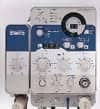The antibiotic telavancin was generally well tolerated and had a safety profile similar to vancomycin in patients with cancer and bloodstream infections, results of a prospective study presented at IDWeek 2014 have shown.
Telavancin is approved for the treatment of complicated skin and skin structure infections and for the treatment of hospital-acquired and ventilator-associated bacterial pneumonia.
“Telavancin may offer another therapeutic option for the treatment of bacteremia caused by susceptible isolates of gram-positive bacteria,” reported Ray Hachem, MD, Professor and Director of the Infectious Diseases Trainee & Observership Program of the University of Texas, MD Anderson Cancer Center in Houston.
Vancomycin, the most commonly used antibiotic for the treatment of resistant gram positive cocci bacteremia, is often not active against strains with MICs >1mg/L. Telavancin, a once-daily injectable semi-synthetic lipoglycopeptide, has a dual mechanism of action that combines inhibition of cell wall synthesis and disruption of bacterial cell membrane function.







